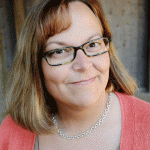Gore Matienzo – Question 1
By
Emily Gore, Mark A. Matienzo
November 2015
1What does it mean for an archive to be, or to be made, “radical”?
Emily Gore
Director of Content – Digital Public Library of America (DPLA)
Mark A. Matienzo
Director of Technology – Digital Public Library of America (DPLA)
Emily
¶ 1 Leave a comment on paragraph 1 0 To me, it means to be daring. To take a stand even though it may not be an accepted norm in the field. To believe in something, to garner support for it, and to do it despite the fact that the practice may not be what everyone else is doing.
¶ 2 Leave a comment on paragraph 2 0
Mark
¶ 3 Leave a comment on paragraph 3 0 All archives have the potential to be radical. The essence of being an archive that is or is becoming “radical” relates to the origin of the word “radical” itself; that which is “radical” originates from the root. One can speak of “radical archives” as such in many senses, but an archive’s commitment to change needs to originate from somewhere in particular; being “radical” in an archival sense means that the process of change or redefinition starts at some root. An archive may be “radical” in the way it was formed or collected, through the intentional acts of one or more individuals concerned with ensuring access to the memory of specific lived experiences. It also may be radical in the way its stewards choose to undertake their work—through the application, rediscovery of, or return to core principles in terms of professional knowledge and values, political ideals, and so forth. Archives also have the opportunity to continue their radicalization by rediscovering, understanding, and reconnecting with their roots.



0 Comments on the whole post
Leave a comment on the whole post
0 Comments on paragraph 1
Leave a comment on paragraph 1
0 Comments on paragraph 2
Leave a comment on paragraph 2
0 Comments on paragraph 3
Leave a comment on paragraph 3